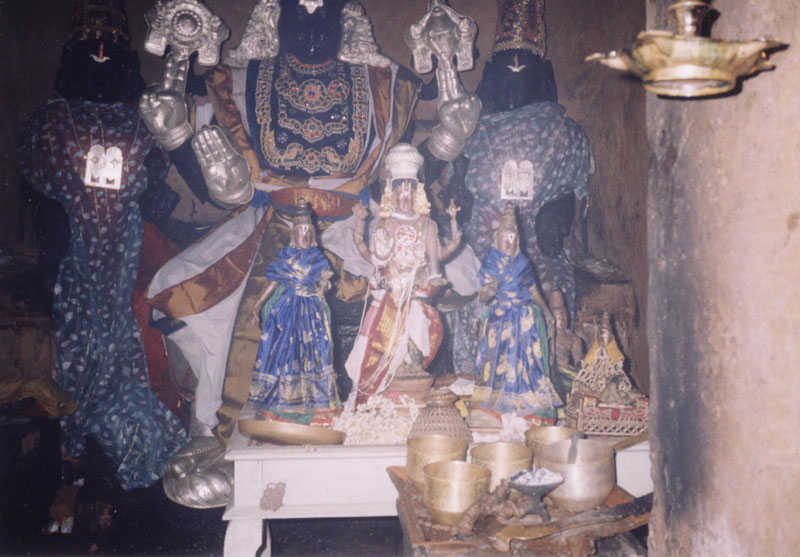natatra sankarihyanti vyadhi dhurbiksha satpara:
This sloka tells the greatness of Thirumantra or Ashtakshara mantra. Where this Eight akshara and three word mantra is chanted, there, disease, famine or robbery will not happen. This mantra was preached by Sriman Narayana to Sri Nara, at Badarikasrama. Same Sri Narayana is gracing in Manimadakkoil, here.
Temple is large with tall main gopuram. Vast space and we find the dwajasthambam. Then we come to the sannidhi of Swami Thirukkoshtiyur Nambi. Then, climbing stairs we reach the main sannidhi of the Lord. Like a madam [ மாடம்] or staired building, we find many tiers. Then we reach maha mandapam, then artha mandapam and finally garbhagruha, where the Lord is in seated pose. Large idol of Sri Narayana can be seen. With right hand in abhaya hastha, the Lord is gracing with Sri Sridevi and Sri Bhudevi on His sides seated. Utsavar is also showing abhaya by the right hand. The discus in the upper arm is in prayoga style. We can worship the Lord with His ubhaya Consorts. Utsavar is comparatively much smaller than Moolavar. The pasuram 'nanda vilakke' [நந்தா விளக்கே] is direct translation of Upanishad words sathyam, gyanam, anantham, brahmam. Vedanta gives the identification for Brahmam or God. Brahmam is sathyam, gyanam and anantham. These three unique features identify Brahmam. Thirumangai Alwar uses Tamil words for these identifications. Nandha is same as sathyam. Vilakku is same as gyanam. Anantham has been translated as alapparkariyai [அளப்பர்க்கரியாய்]. Sathyam means eternal or never changing nor diminishing. In Tamil nandhu [நந்து] means reducing and so nandha is not reducing, same as sathyam. Vilakku is light or lamp and it is swayam prakasam; which means it can be sighted by its own glow. It needs no external aid to identify. It also lights up the surrounding area and makes us to see things in that area. Gyanam of Brahmam is self indicating and identifies all others. Anantham means without end. So Alwar says He is immeasurable by the word alapparkkariyai. Normally, we can measure anything in this world by three methods. They are time, place and matter. By time we can say certain things existed for a period of time. They are limited by time. Certain things are at some place at a given time; but they can not be seen at other places at the same time. They are bound by space limitations. Matter means its shape, size and composition are all defined and it is bound by these limitations. Brahmam or the Lord is not bound by any of these three constraints. He was there, is now and will be there; He has infinite period. He can not be limited by place as He is without exception, all pervading at all times. Next, He can not be constrained by any figure or shape or size. Understanding the greatness of the Lord, we talk about Him; by talking we derive pleasure. The Lord reveals Eight identifications for His devotees, wherever they are born, and says that such devotees can be worshiped like they would worship the Lord. Devotees with happiness talk about Him. Each one eulogises the Lord for one quality or the other. This way Bhakti grows. We should bear in mind that at least when we are in temples we should not talk about anything other than the Lord and His qualities. Now sloka 9:
mac-citta mad-gata-prana
bodhayantah parasparam
kathayantas ca mam nityam
tusyanti ca ramanti ca
"The thoughts of My pure devotees dwell in Me, their lives are fully devoted to My service, and they derive great satisfaction and bliss from always enlightening one another and conversing about Me."
The Lord tells Arjuna that His devotees praise Him and find great enjoyment in conversing about Him. Mat citta = mind or thoughts always in Me [Sri Krishna], mad-gata-prana = taking Me [Sri Krishna] as thier life, parasparam = [devotees] mutually, bodhayanta = revael to each other, kathayanthas ca = also speak to others about the stories, mam = [of] Me [Sri Krishna], nityam = daily or always, tusyanti ca = are happy, ramanti ca = are happy. Why this word happy is repeated? Tusyanti means the happiness derived by the person telling; and, ramyanti means the pleasure of the listener. Thus both the speaker and audience are happy. We should note a point here. In Upanyasam or religious discourse, it is not that one tells something the others do not know; but it is to be regarded as sharing of thoughts on the Lord. The speaker should enjoy the subject he is delivering. Payment or number of persons listening or fame should not be the factors for religious discourses. Sri Krishna never likes them. in fact, upanyasam should not be done with pomp. Number of persons in the audience should be immaterial and the speaker should only think on the subject and derive pleasure in speaking out the Lord's qualities. When two devotees meet, their conversation is only about the Lord. They are not affected by time or place. Talking about Him inspires them to talk more. Sage Sukha was discoursing to King Parikshit. When he came to the 9th or penultimate skantham [chapter], he told about the story of Sri Krishna very precisely and paused. Parikshit was restless and said why the sage did not elaborate on the Lord, Who helped his grand fathers, Yudhishtra and his brothers. The sage replied that being a King, Parikshit might be feeling hungry and might require rest. Parikshit replied that having drunk the nectar or amrut of the Lord's stories, by listening to the sage, he was never feeling hungry and required nothing else.

No comments:
Post a Comment